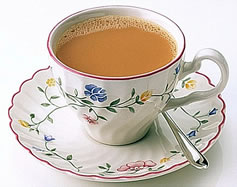My cup of tea
Meaning
Something or someone that one finds pleasing.
Origin
 An English website about the English language can't of course be complete without some consideration of tea. Tea has been around for a long time, and so has the British slang term for it - 'char'. In fact, it was known in the west by that version of the Mandarin ch'a before the name migrated through several languages to 'chay', 'tay' and was finally Anglicised as 'tea'. The Dutch adventurer Jan Huygen van Linschoten was one of the first to recount its use as a drink, in Discours of voyages into ye Easte & West Indies, 1598:
An English website about the English language can't of course be complete without some consideration of tea. Tea has been around for a long time, and so has the British slang term for it - 'char'. In fact, it was known in the west by that version of the Mandarin ch'a before the name migrated through several languages to 'chay', 'tay' and was finally Anglicised as 'tea'. The Dutch adventurer Jan Huygen van Linschoten was one of the first to recount its use as a drink, in Discours of voyages into ye Easte & West Indies, 1598:
The aforesaid warme water is made with the powder of a certaine hearbe called Chaa.
'My cup of tea' is just one of the many tea-related phrases that are still in common use in the UK, such as 'Not for all the tea in China', 'I could murder a cup of tea', 'More tea vicar?', 'Tea and sympathy', 'Rosie Lee', 'Storm in a teacup' and so on.
In the early 20th century, a 'cup of tea' was such a synonym for acceptability that it became the name given to a favoured friend, especially one with a boisterous, life-enhancing nature. William de Morgan, the Edwardian artist and novelist, used the phrase in the novel Somehow Good, 1908, and went on to explain its meaning:
"He may be a bit hot-tempered and impulsive... otherwise, it's simply impossible to help liking him." To which Sally replied, borrowing an expression from Ann the housemaid, that Fenwick was a cup of tea. It was metaphorical and descriptive of invigoration.
People or things with which one felt an affinity began to be called 'my cup of tea' in the 1930s. Nancy Mitford appears to be the first to record that term in print, in the comic novel Christmas Pudding, 1932:
I'm not at all sure I wouldn't rather marry Aunt Loudie. She's even more my cup of tea in many ways.
In keeping with the high regard for tea, most of the early references to 'a cup of tea' as a description of an acquaintance are positive ones, i.e. 'nice', 'good', 'strong' etc. The expression is more often used in the 'not my cup of tea' form these days. This negative usage began in WWII. An early example of it is found in Hal Boyle's Leaves From a War Correspondent's Notebook column, which described English life and manners for an American audience. The column provided the American counterpart to Alister Cooke's Letter from America and was syndicated in various US papers. In 1944, he wrote:
[In England] You don't say someone gives you a pain in the neck. You just remark "He's not my cup of tea."
The change from the earlier positive 'my cup of tea' phrase, to the dismissive 'not my cup of tea' doesn't reflect the national taste for the drink itself. Tea remains our cup of tea here in the UK. According to the United Kingdom Tea Council (of course, there had to be one) 60 million of us down 160 million cups of the stuff each day.
See also: the meaning and origin of 'Not for all the tea in China'.
沒有留言:
張貼留言